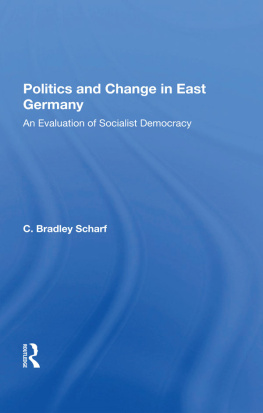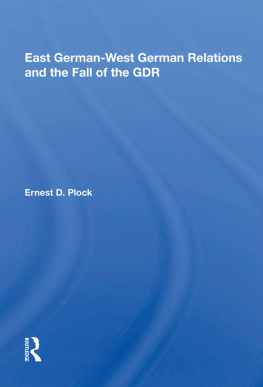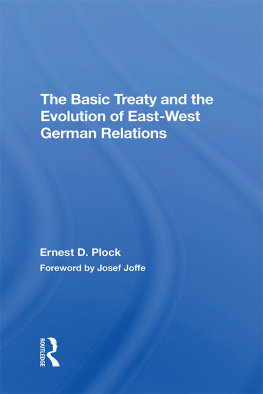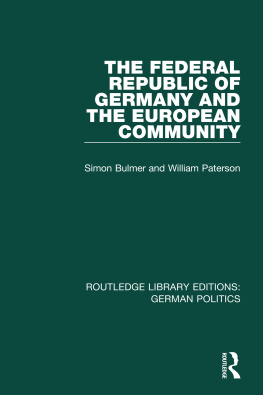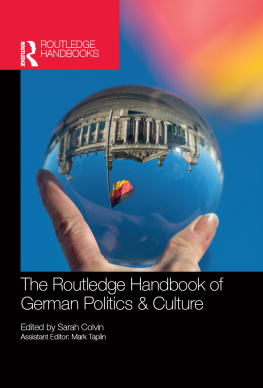Politics and Change in East Germany
First published 1984 by Westview Press
Published 2019 by Routledge
52 Vanderbilt Avenue, New York, NY 10017
2 Park Square, Milton Park, Abingdon, Oxon OX14 4RN
Routledge is an imprint of the Taylor & Francis Group, an informa business
Copyright 1984 Taylor & Francis
All rights reserved. No part of this book may be reprinted or reproduced or utilised in any form or by any electronic, mechanical, or other means, now known or hereafter invented, including photocopying and recording, or in any information storage or retrieval system, without permission in writing from the publishers.
Notice:
Product or corporate names may be trademarks or registered trademarks, and are used only for identification and explanation without intent to infringe
Library of Congress Catalog Card Number: 845183
ISBN 13: 978-0-367-28360-5 (hbk)
Tables
Figures
Map of the German Democratic Republic
In writing this introduction to East German politics and society, I have in mind three purposes.
First, I want to provide a study that is readily comprehensible to English-speaking audiences. West Germans still provide much of the best scholarship on their neighbor to the east; yet translated texts reflect an inevitable preoccupation with the German problemthe (implicitly unnatural) division of Germany. Perhaps reflecting some sense of uncertainty over the past and future of their own Federal Republic, West German authors typically devote much effort to portraying the German Democratic Republics (GDR) inferior record of material accomplishment and political liberty. In contrast, my intent here is to regard the GDR primarily in its own terms and to view its existence as yet another chapter in the discontinuous political history of the German people. The GDR is in many respects an anomaly, but no more so than is the Federal Republic.
Second, I believe that a comparative frame of reference enhances understanding. The German Democratic Republic is unique, as are all other states, yet many of its problems and processes are shared with other systems. For some purposes, the most useful comparisons are with allied nations of the socialist-state community; for other purposes, comparisons are more meaningful with Western Europe, Scandinavia, and even North America. In addition to specific illustrations, this approach involves a consistent application of the time-tested concepts of comparative political science. I reject the notion that the study of communist systems requires an entirely separate language of analysis; in my view, politics in the GDR is best understood as a specific manifestation of more or less universal political phenomena.
Finally, this book is joined together by a recurrent theme: the search for the national identity of the German Democratic Republic. Pursuit of this end requires that we cast off the academic residue of cold-war encounters with communist Europe. For more than three decades, memories of human tragedy and Western disillusionment have perpetuated the image of totalitarian rule in that region. Today most scholars recognize the shortcomings of the totalitarian model, especially its overwhelmingly propagandists usages, its proclivity to exaggerate and reify discrete events, and its inability to distinguish one system from another or to account for change within a single system. But outside the community of specialists, this earlier image dies hard. Particularly in the case of East Germany, Westerners have been most reluctant to abandon a superficial, totalitarian interpretation.
A broader, more realistic interpretation recognizes that the present German Democratic Republic is a compound of at least four sets of influences. First of all, the people of the GDR are Germans, and their culture and politics are both a continuation of and a departure from historical German precedent. Second, the GDR lies very much within the Soviet sphere of influence. As a consequence, East Germany faces severe restraints in both its foreign and domestic policies, and it is frequently an object and a victim of East-West confrontations. Third, the GDR has a socialist economy, oriented toward skilled labor and technology. It is also deficient in raw materials and energy and, therefore, highly dependent upon foreign trade. Planning for sustained economic growth is thus a forbidding and treacherous task. Last, the GDR has created what is in many ways an advanced urban-industrial society. This social transformation has spawned problems quite familiar in many Western nations, including environmental pollution, urban crime, weaker family structures, and a lower tolerance for social inequalities.
German culture, Soviet hegemony, economic restraints, social changeall of these elements flow together to form a distinctive and increasingly significant political entity. To gauge the importance of each element, and the ways in which the people and political leaders of the GDR seek to make these elements compatible, is the imposing task of this rather short book.
Much of this work had its origins during my studies in Berlin in 1969. I am indebted to a great many colleagues who have shared their insights over the years. In particular, I wish to thank Arthur M. Hanhardt, Jr., Hartmut Zimmermann, and Gero Neugebauer for their encouragement and remembered kindnesses. I wish to express my gratitude to Seattle University for facilitating completion of the manuscript. Special thanks go to Ruth Tressel for heroic typing efforts and, most importantly, to Ann Scharf, my kind and constant critic.
C. Bradley Scharf
1
Past and Future in the GDR
The German Democratic Republic (GDR or East Germany) is largely a product of the collapse of the Third Reich and the subsequent division of Europe into hostile spheres of influence. Long viewed in the West as merely the Soviet occupation zone, the GDR has experienced diplomatic isolation, economic discrimination, and political penetration. It accommodates a mighty Soviet military presence and exhibits a continuing fear of Western challenges. It also severely restricts civil rights on the grounds of fragile national security.
East Germans buy consumer goods from the Federal Republic of Germany (West Germany), watch West German television, denounce capitalism, and envy the prestige and material success of the Federal Republic. East Germans also buy raw materials from the Soviet Union, belittle Russian culture, struggle to make socialism work, and regard Soviet power with a mixture of fear and admiration.
East Germanys, leaders, whether in the dominant Socialist Unity party (SED) or in one of its associated political or social organizations, share a commitment to socialist democracy, an unfolding form of participatory rule based upon emerging standards of economic and social equality. They also share a refined sense of the policy restraints imposed by limited economic and fiscal resources, military dependence upon the Soviet Union, and deficient popular acceptance of official goals as worthy and the state as legitimate. Like the educated public, but perhaps more acutely, the GDRs leaders feel the pull of both East and West, the burden of a tragic past, and the fading inspiration of an ever-receding future.
The record of communist rule is not without its bright spots. Despite many unfavorable conditions, the GDR today boasts a high level of industrial and agricultural modernization, a steadily improving standard of living, a wide complement of progressive social policies, and an active role in world affairs. But the present is nevertheless a difficult time. These achievements are now perceived as modest and routine, and they have not supplanted the need to grapple with conflicting concepts of public purpose and national identity.

